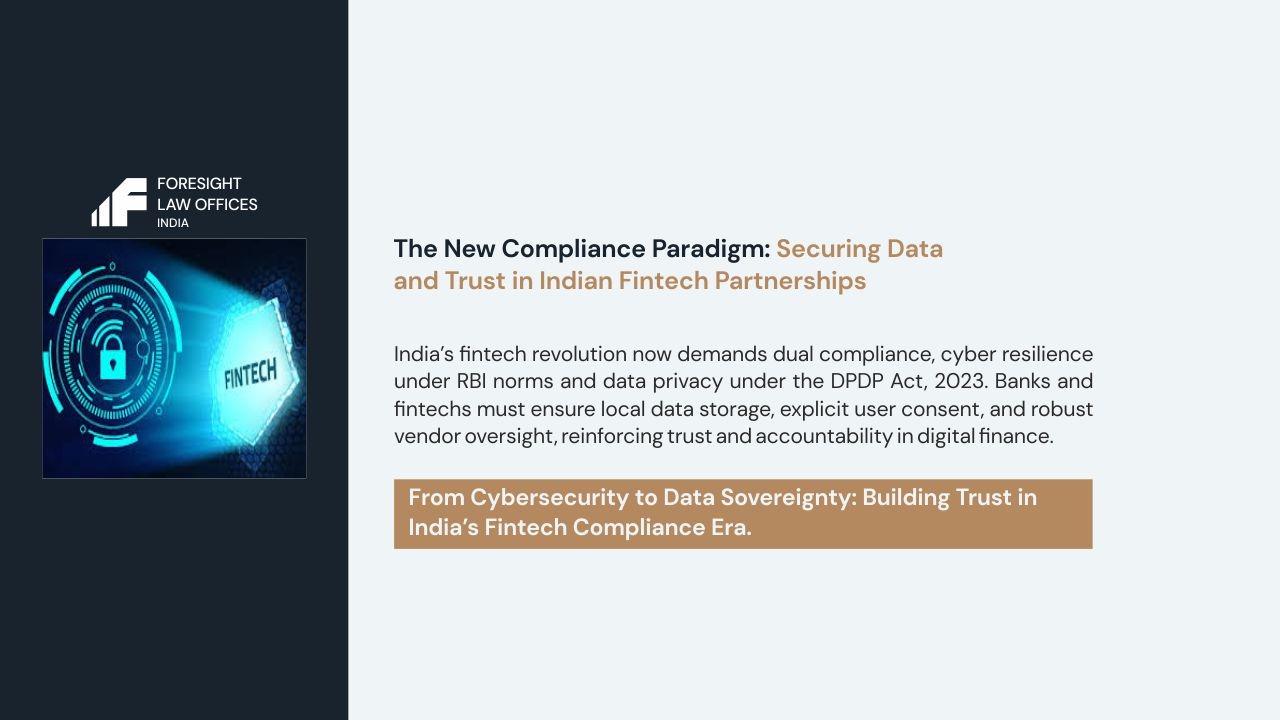The Data-Driven Nexus of Banking and Technology
The rapid growth of the Indian fintech sector, fueled by seamless data exchange, has transformed how financial services are delivered. From digital lending to payment aggregators, success is increasingly defined by the agility of partnerships between regulated entities (banks) and technology providers (fintechs).
However, this data-centric model introduces systemic risks, primarily revolving around cyber security and customer privacy. The regulatory environment has responded decisively, creating a new, layered compliance mandate. This paper examines the convergence of the Reserve Bank of India’s (RBI) operational and cyber security guidelines with the sweeping legal requirements introduced by the Digital Personal Data Protection Act, 2023 (DPDP Act).
The core challenge for banks and fintechs is no longer just mitigating technical risk, but establishing explicit legal accountability for customer data throughout its lifecycle.
The Dual Mandate: Cyber Resilience and Data Fiduciary Accountability
The current regulatory landscape establishes a two-pronged compliance imperative: first, ensuring robust cyber resilience through operational standards, and second, upholding the individual’s right to privacy through legal and consent protocols.
- Cyber Resilience: The RBI’s Foundation of Trust
Recognizing that fintech partnerships inherently rely on continuous, secure data flows, the RBI has placed stringent operational requirements on all players. These safeguards are designed to ensure the integrity and continuity of financial services while actively monitoring for fraud:
- Mandatory Cyber Hygiene: Draft banking directions explicitly mandate ISO-standard cyber audits. Technology controls, such as vendor implementation of strong encryption, strict access controls, and comprehensive secure audit logs, are now essential for partnership viability.
- Operational Security: The emphasis on network-independent mobile applications and continuous transaction monitoring reflects a focus on mitigating fraud risks across decentralized digital channels.
- The Legal Shift: Digital Personal Data Protection Act, 2023
The DPDP Act, 2023 (expected to become effective by late 2024), represents a fundamental shift in legal responsibility, moving beyond general cyber security to focus specifically on the rights of the individual (the ‘data principal’). The Act imposes broad, non-negotiable obligations on “data fiduciaries” (typically banks or fintechs that determine the purpose of data processing) and mandates them to ensure compliance by all “data processors” (vendors and sub-processors).
Key requirements under the DPDP Act include:
- Explicit Consent: Data collectors must obtain free, specific, informed, and unambiguous consent before collecting personal data, with an easy mechanism for the user to withdraw that consent at any time.
- Purpose Limitation and Data Minimisation: Data processing must only occur for the specified, lawful purpose for which consent was initially obtained.
- Data Principal Rights: The Act enshrines user rights, including the right to access, correction, and erasure of their personal data. Non-compliance, including failure to implement adequate security safeguards, carries significant penalties.
- Regulatory Convergence: Tying Privacy to Operational Fitness
The RBI has already begun integrating the DPDP Act’s requirements into its existing oversight mechanisms, making privacy compliance a prerequisite for innovation. For example, the revised RBI Regulatory Sandbox framework (March 2024) explicitly requires participating fintech firms to process data strictly per the DPDP Act and maintain “robust technical and organizational measures” against data breaches. This means that a bank using a fintech service must ensure the vendor’s systems and policies—including privacy notices and consent mechanisms—are fully DPDP-compliant, effectively making the bank “fully accountable” for any third-party misuse.
The Data Location Dilemma: DPDP Flexibility vs. RBI Rigidity
A key challenge for fintechs operating with global platforms and cloud infrastructure is reconciling two distinct regulatory philosophies regarding the physical location of customer data.
The Conflict: Localisation vs. Cross-Border Flow
- RBI’s Stricter Stance: Under RBI’s digital lending and payment data guidelines, the data of borrowers must be stored only in India. While processing abroad may occur, any copy of borrower data must be deleted from foreign systems within 24 hours of processing. This is a clear, mandatory data localisation requirement for all critical financial information.
- DPDP Act’s Liberal Approach: The DPDP Act, conversely, adopts a permissive model for international transfers. It allows personal data to be transferred outside India to any country unless the Central Government explicitly places that country on a “negative list.” This flexibility supports India’s role in the global outsourcing economy.
The Resolution: The Stricter Rule Prevails
The DPDP Act explicitly states that it does not override existing laws that impose a “higher degree of protection or restriction” on data transfers.
Since the RBI’s guidelines mandate the storage of borrower data within India, this requirement is deemed the “stricter rule” and takes precedence over the DPDP Act’s cross-border allowance. Therefore, for all borrower data processed through fintech channels (especially digital lending), the mandatory domestic storage requirement remains the law.
Compliance teams must therefore implement systems that meet the stricter localisation mandate for financial data while simultaneously adhering to the DPDP Act’s consent and transparency rules.
Preparing India for an Era of Unified Accountability
The regulatory landscape governing Indian fintech has matured from basic cyber security to comprehensive accountability. The enforcement of the DPDP Act, alongside the RBI’s sectoral rules, creates a single, high-stakes compliance bar. The path forward for regulated entities (banks/NBFCs) and their fintech partners rests on three pillars:
- Consent as Currency: Shifting from tacit or implied consent to explicit, informed, and revokable user consent for every specific purpose of data use.
- Unbreakable Contracts: Utilizing robust contractual safeguards, including strong indemnities and audit rights, to flow down accountability and risk to the third-party vendor.
- Local Data Priority: Ensuring that all critical financial data, particularly borrower data, remains stored within Indian borders, adhering to the RBI’s stricter localisation requirements even where the DPDP Act might permit external transfers.
By aligning their technology, legal documentation, and operational protocols with this unified regulatory framework, financial institutions can foster trust, manage enormous penalty risks, and secure their future in India’s booming digital economy.
Lessons from Enforcement Cases
Recent enforcement actions illustrate the costs of inadequate controls. In January 2025, RBI fined an NBFC (Indian School Finance Co.) for outsourcing its core internal audit function, a violation of NBFC outsourcing directions. This highlights that certain functions must remain in-house and that regulators will penalize banks/NBFCs when they delegate decisional roles or violate outsourcing norms.
In another example, RBI penalized a P2P lending NBFC (“Finzy”) for not including RBI’s inspection rights in its contract with service providers. The absence of audit clauses (required by earlier RBI NBFC/P2P guidance) was noted as a compliance breach. Similarly, other fintech platforms have been fined for non-compliance with prescribed processes and disclosures under NBFC/P2P directions, underscoring that procedural lapses (even by fintechs) lead back to the regulated entity.
The digital lending context too carries pitfalls. If a fintech misleads a borrower or skips disclosures, RBI holds the lending bank accountable. For instance, a lender was fined in 2024 for outsourcing customer acquisition to agents who indulged in coercive recovery practices, violating RBI’s recovery agent and fair practice rules. The bank could not escape liability simply by blaming its agent.
These cases reinforce that “governance failures” in fintech ties attract regulatory action. Banks and NBFCs cannot treat vendors as isolated contractors; they must oversee them as extensions of the bank. As one analysis puts it, regulated entities “cannot outsource accountability” – they remain ultimately responsible for consent management, data breaches, disclosure compliance and grievance redressal.
Best Practices in Contracts, Compliance, and Governance
To meet RBI and DPDP expectations, corporate and legal teams should adopt a proactive compliance framework:
| Robust Contracting | Develop standardized outsourcing templates incorporating the clauses above. Ensure legal review for every fintech tie-up. Contracts should clearly delineate legal liability (who bears customer claims, regulatory fines, etc.) and include SLA penalties/incentives linked to compliance (e.g. fines for missed uptime, breach). |
| Due Diligence & Onboarding | Treat vendor selection like an extended KYC process. Conduct deep due diligence on fintech partners’ financial health, security controls, and regulatory record. Require the vendor to provide certifications (e.g. ISO 27001) and evidence of DPDP-readiness (privacy policies, consents). |
| Integration of Privacy by Design | Coordinate with IT and product teams to ensure any fintech integration enforces opt-in consents, records audit trails, and respects data-principal rights. Integrate with expected consent-manager infrastructures as DPDP norms solidify. |
| Ongoing Monitoring | Set up a vendor risk management program. This includes periodic risk assessments, performance reports, security audits (internal or third-party), and compliance checks (e.g. on SLAs, data handling). Flag issues early – RBI expects swift remedial action for any deviation. |
| Governance and Reporting | Maintain a master inventory of all fintech vendors and outsourced services, as required by RBI. Regularly report to the board or risk committees on third-party risk exposure. Document all policies (outsourcing, data protection, incident response) and refresh them annually. |
| Incident Preparednes | Ensure incident response plans account for vendor channels. The RBI mandates reporting of vendor-detected cyber incidents within 6 hours and notification of breach to RBI. Banks should thus incorporate vendor incident reporting into their own governance. |
| Training and Awareness | Employees handling fintech channels should be trained on compliance obligations. For example, front-line staff must know not to coerce digital enrollment (per draft banking directions) and how to handle borrower grievances related to fintech apps. |
| Alignment with Emerging Norms | Stay alert for finalization of draft rules (e.g. Digital Banking Authorisation) and DPDP rules. Adjust policies to new RBI stipulations on fintech (such as source-code audits announced in Nov 2023 or expanded AML requirements for fintechs, etc.). |
By embedding these safeguards into legal agreements and control frameworks, banks can mitigate the contractual and regulatory risks of fintech partnerships. Ultimately, the goal is to leverage innovation without ceding the prudential oversight and customer accountability that regulators demand






